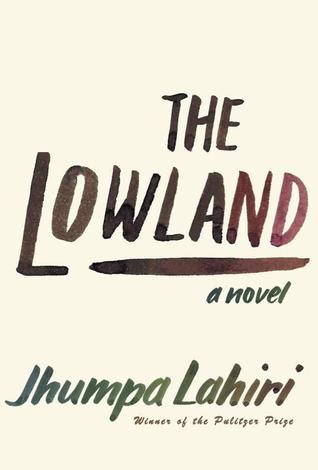The Lowland begins as the story of two brothers, born fifteen months apart and inseparable companions, who are raised in (what I suppose is) middle class comfort in the teeming city of Calcutta. I have long enjoyed novels set in India, and not having read anything specifically set in Calcutta, I was prepared to be mildly familiar with the culture and hoping to learn something new. I wasn't disappointed in this as I had never heard of the Naxalite Movement -- a revolutionary group, born in tragedy, that sparks a Marxist quest for justice in the younger of the brothers, Udayan. Unsurprisingly, this has tragic consequences and the remainder of the story is weighted with grief and regret and longing.
The Lowland takes big jumps in time as it goes along: the young brothers are playful boys then serious high school students, then suddenly they are men following separate paths. It is told mostly sequentially, but especially near the end, there are leaps backwards in time to fill in some missing information. This notion of time-- of how we allow the past, present and future to affect the way we live our lives -- is an important element of this story, and especially for Gauri, the young widow who becomes a Philosophy professor. As I have always had an interest in the nature of time, these sections were especially interesting for me. Not only does Gauri write a comparison of Nietzsche's and Schopenhauer's concepts of circular time and study On the Phenomenology of the Consciousness of Internal Time, but she has a unique perspective:
She had been born with a map of time in her mind. She pictured other abstractions as well, (but) her strongest image was always of time, both past and future; it was an immediate horizon, at once orienting and containing her. Across the limitless spectrum of years, the brief tenancy of her own life was superimposed. To the right was the recent past: the year she'd met Udayan, and before that, all the years she'd lived without knowing him. There was the year she was born, 1948, prefaced by all the years and centuries that came before.
To the left was the future, the place where her death, unknown but certain, was an end point…
Only the present moment, lacking any perspective, eluded her grasp. It was like a blind spot, just over her shoulder. A hole in her vision. But the future was visible, unspooling incrementally.
She wanted to shut her eyes to it. She wished the days and months ahead of her would end. But the rest of her life continued to present itself, time ceaselessly proliferating. She was made to anticipate it against her will.
There was the anxiety that one day would not follow the next, combined with the certainty that it would.
This unique perspective led to her studies:
She saw time; now she sought to understand it. She filled notebooks with her questions, observations. Did it exist independently, in the physical world, or in the mind's apprehension? Was it perceived only by humans?...
In Hindu philosophy the three tenses -- past, present, future -- were said to exist simultaneously in God. God was timeless, but time was personified as the god of death
Descartes, in his Third Meditation, said that God re-created the body at each successive moment. So that time was a form of sustenance…
In one of her notebooks from Calcutta were jottings in Udayan's hand, on the laws of classical physics. Newton's theory that time was an absolute entity, a stream flowing at a uniform rate of its own accord. Einstein's contribution, that time and space were intertwined.
He'd described it in terms of particles, velocities. A system of relations among instantaneous events. Something called time reversal invariance, in which there was no fundamental distinction between forward and backward, when the motions of particles were precisely defined.
The future haunted but kept her alive; it remained her sustenance and also her predator.
Gauri, now studying in the United States where she lives with Subhash (her dead husband's brother who married her, raising Udayan's daughter as his own) makes her discoveries during the time of hippies and campus riots and women's lib -- it is nearly unsurprising that the atmosphere, coupled with her inability to live in the present, prompted Gauri to abandon her family and go off to pursue her own life. I recently read about two women who did just that at about the same -- in fiction, Inez Gallo in Night Film, and in real life, Doris Lessing, the Nobel Prize winning author. Reading about it without context, that's a hard act for the mother in me to understand, but we get to know Gauri just enough to see that her escape is inevitable and pitiable. When Gauri and Bela meet near the end of the book, decades later, I was in tears, understanding the pain on each side and seeing that the characters couldn't have behaved in any other way -- there was truth in the messiness of it all and recognising these moments of truth is the reason why I read.
And as an aside, although the 2013 Man Booker has already been awarded, I would have rated this book above The Luminaries.

